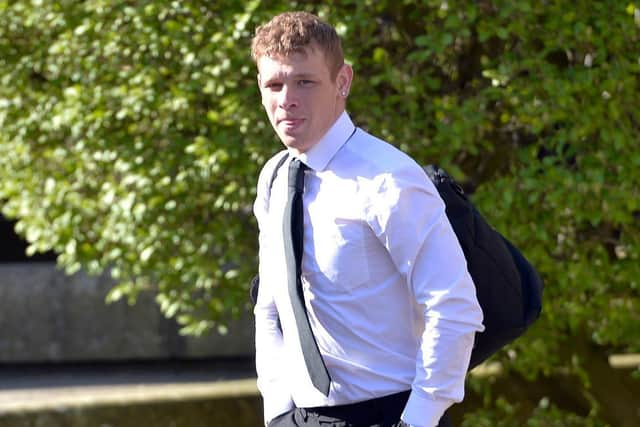Juryless trials Scotland: Sean Hogg conviction quashing why 'judges cannot be trusted' to replace juries on rape cases
The quashing of Sean Hogg’s unpaid work sentence after he was convicted of raping a 13-year-old girl is a “prime example” of why jury-less trials should not go ahead in Scotland, the legal profession has said.
Hogg, who smirked as he left court after being told he would not be subject to a retrial following his acquittal, was convicted of raping the 13-year-old on various occasions in 2018, when he was aged 17.
Advertisement
Hide AdAdvertisement
Hide AdHe was spared jail by Judge Lord Lake at the High Court in Glasgow in April and was instead given 270 hours of unpaid work, although he said if Mr Hogg was over 25, he would have been sentenced to four or five years behind bars.


This conviction was overturned after prosecutors admitted “mistakes were made” during his trial, with the case sparking considerable political fury and anger among campaigners. It has now been referenced as a “prime example” of why jury-less trials, a pilot of which is planned as part of the Scottish Government’s justice reforms, should not ahead.
Speaking at a fringe event hosted by the Law Society of Scotland at the SNP conference on Tuesday, the president of the Scottish Solicitor’s Bar Association, Stuart Murray, attacked the plans as a “dangerous exercise”.
“We should not be trusting judges in cases that are as serious as this,” he said. "In an ideal world we would have a jury trial for every possible type of offence, but we can’t commit the financial and emotional involvement to bring in a jury of our peers of 15 for somebody nicking a £20 bottle from Boots. That’s not how this works.
"You preserve those issues for the most serious of offences and we cannot trust judges to make those decisions for a number of decisions.
"I realise this was a sentencing issue … but Lord Lake, I think if he were asked, made a complete pig’s ear of the Sean Hogg case. I see that, respecting Lord Lake as generally he is a very well respected High Court judge, that is a prime example of why you can’t trust judges in these most serious of offences.”
Sheila Webster, president of the Law Society of Scotland, also heavily criticised the Bill.
She said: “Parts of the Bill we do feel risk undermining the integrity of the criminal justice system. It is actually a really important thing that the integrity of the criminal justice system remains in place and we all have trust and faith in it, it is critically important to society.”
Advertisement
Hide AdAdvertisement
Hide AdStuart McDonald, the SNP’s former justice spokesperson in Westminster prior to being sacked during the party’s reshuffle earlier this year, said jury trials should not be “sacrosanct”. He said he was “reluctantly” backing the Bill.
"Obviously there is significant resistance to this from solicitors and I wonder if there is some sort of middle ground that can be found,” he said, raising the suggestion of lay people or experts in sexual offences sitting alongside judges during the pilot.
He added: “There may be different ways that we could perhaps find a middle ground here to try and bring this forward.”
A Scottish Government spokesperson said: “The proposal to pilot judge only rape trials is a recommendation of a review carried out by Lady Dorrian, Scotland’s second most senior judge, to improve how the justice system treats rape victims. The purpose of a pilot is to gather evidence on the most effective way to reach fair verdicts in these complex cases.
“We have worked closely with the legal sector on the proposals and will continue to do so during the development and evaluation of the pilot.”
